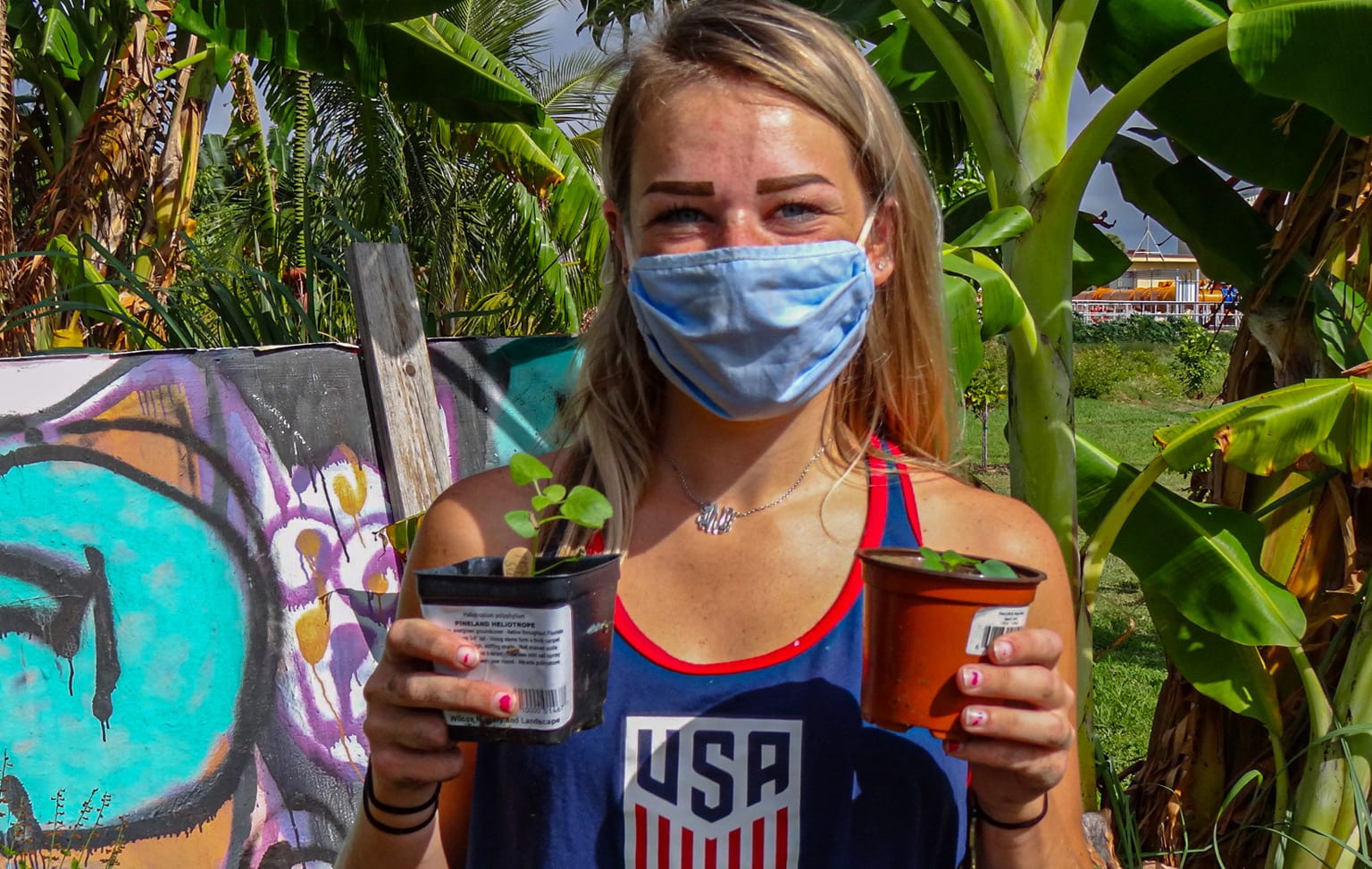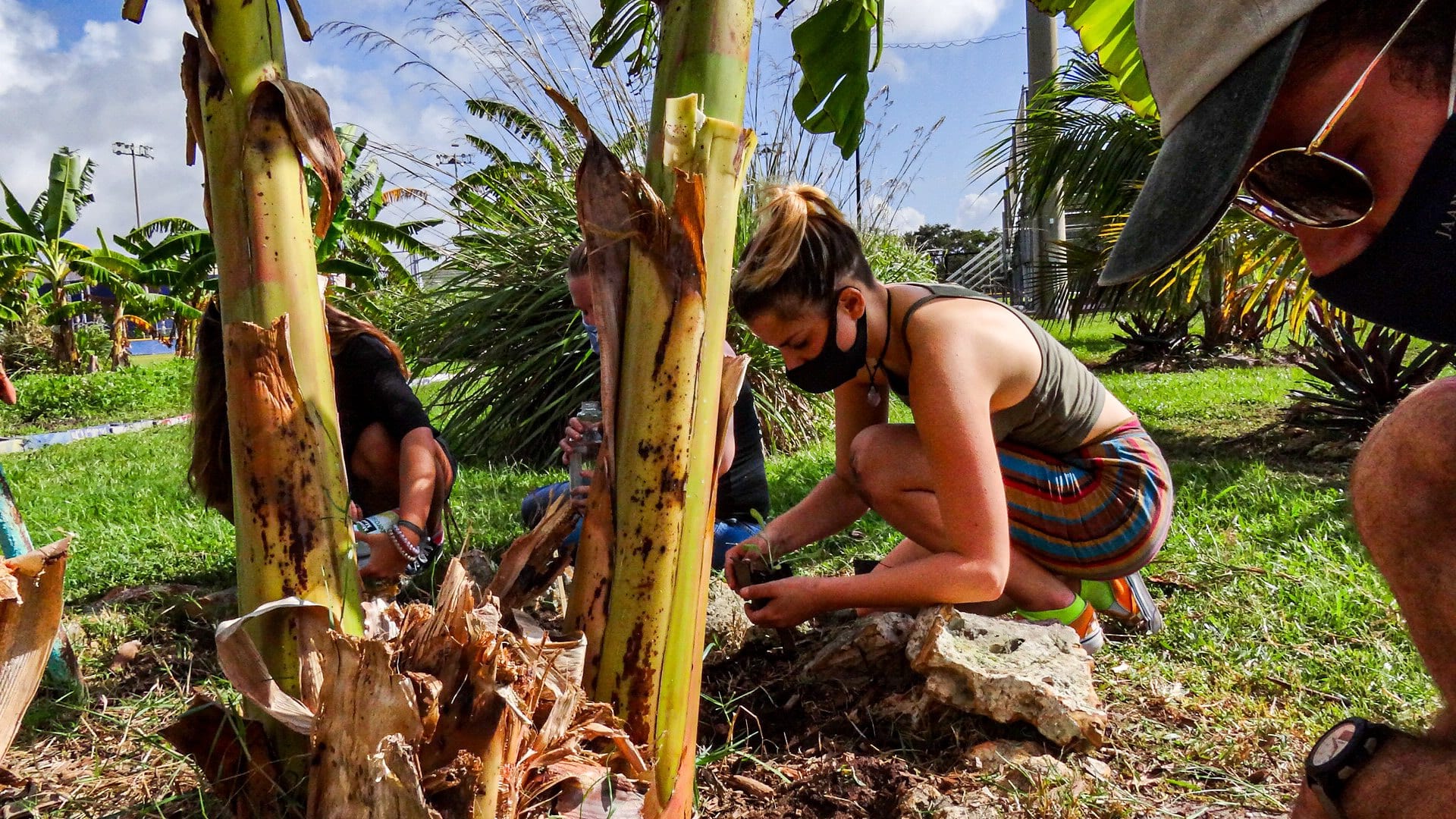
Alyssa Walsh ’22 holds Florida native plant species that draw pollinator butterflies. Photo: Max Goldman ’21
Imagine walking through a maze of wildflowers—freckled with butterflies—viewing sustainable art installations and listening to music, ambient sound and monologues that correspond with every species you encounter along the way.
Beginning December 8, Eckerd College residents and visitors will be able to do just that thanks to an unconventional solution for a very 2020 problem.
Performance and the Environment, a theatre class that routinely attracts students from across disciplines and is taught by Visiting Assistant Professor of Theatre Antonia Krueger, Ph.D., ends every semester with a performance for the community. This year’s play was supposed to correspond with the Climate Change Theatre Action—a biennial, global short-play reading series timed to coincide with the United Nations Conference of the Parties meeting. But, as has been a theme of the year, none of those plans came to fruition.
“With the compressed semester [because of the phased return plan this fall], it was important to find a project that allows people to remain socially distant while also enjoying a theatrical experience,” Krueger said.

Rachel McNear ’22 and Andrew Weisberg ’21 join students from their theatre class to prepare the garden for the upcoming performance. Photo: Max Goldman ’21
She tapped into her faculty resources—Nancy Schuler, assistant professor and electronic services, collection development and instruction librarian; Elizabeth Forys, Ph.D., professor of environmental science and biology; and Dave Himmelfarb, environmental studies instructor and internship coordinator—to build an experience that would benefit the planet as well as the community.
“I talked to Beth about what sorts of Florida native plant species would work best ecologically on our campus to draw pollinator butterflies, and then Nancy worked with the students to make them experts in each species and helped them find research and information about each of them,” Krueger added. “Dave is the adviser of the Garden Club, so I reached out to him to see if we could work alongside our club to plant the project in their space. And one of [Associate Professor of International Business] Sandra Graҫa’s students is earning her Reflective Service-Learning hours by marketing our event. It was truly an interdisciplinary effort.”
In October, Krueger’s 27 students laid the literal groundwork by planting wildflower seedlings in the Garden Club’s acre of land behind the North Recreation Field. Andrew Weisberg, senior environmental studies student from Dunwoody, Georgia, is a Garden Club member and a student in the class.
“The reason I wanted to work with this class is because the class is focusing on the importance of native plants. Having native botanical species is important to so many parts of the ecosystem. They help to bring in pollinating species, control erosion, replenish soil health and so much more,” Andrew said.
Florida native plants will attract Florida native butterflies that will ultimately help pollinate the fruits, vegetables and other flora the club cultivates year-round, Krueger said. The next phase of the project split students into groups where they will create a two- to three-minute audio performance to correspond with a specific numerically marked section of the garden. “It can be anything, really, but what I’ll be looking for is that the piece has a clear beginning, middle and end; that it is edited to a specific audio format; and that the aesthetics align with what the viewer is experiencing visually,” Krueger said.
Each piece will be uploaded to a website that audience members will access when they enter the garden. Viewers will be asked to bring a mobile device, headphones and a writing implement to fully enjoy the performance. After moving through the installation; hearing each piece; and seeing the sustainable art made of bamboo, shells and other materials, viewers will be asked to write a wish or intention on a piece of wildflower-seed paper and plant it in the garden.
“Even if you feel alone, from a distance, we have community,” Krueger said. “Planting your wish or intention will give our community the opportunity to see those beautiful intentions bloom.”












